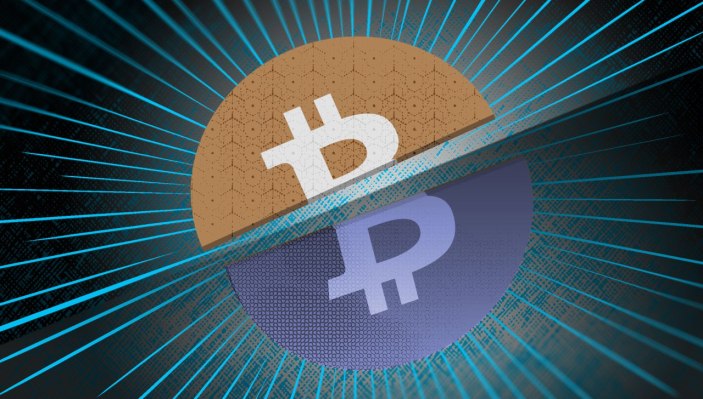As the crypto markets continue to tumble, a major industry player’s beliefs are also taking a turn as he shifts from being a “Bitcoin maximalist” to what he calls a “Bitcoin rationalist.” The reason for this change seems to be that he sees a future for the coin in decentralized finance (DeFi).
Long-time Bitcoin backer Dan Held exclusively told TechCrunch he has stepped down from his role as director of growth at crypto exchange Kraken. He will be taking an active role building DeFi products on top of Bitcoin, starting with a marketing partner role at Bitcoin-focused ecosystem and platform, Trust Machines. A source familiar with the matter also said Held is expected to take on a brand ambassador role at Kraken.
“Bitcoin is what I care about. Nothing changed there,” said Held, who has been in the space for over ten years. In his view, the stakes are rising for Bitcoin as the narrative in the crypto industry shifts towards decentralized finance (DeFi) from centralized finance (CeFi), and as market participants “find more meaning building on top of DeFi.”
The crypto industry, and Bitcoin, is at an inflection point, he said. “I think there’s going to be this renaissance in the Bitcoin DeFi world. Right now, DeFi is not synonymous with Bitcoin, and most people think those two words don’t really go together.”
I don’t think it’s going to be a single chain world. It’s going to be a multi-chain world. Dan Held, marketing partner, Trust Machines
DeFi has long been the playground for alternatives to Bitcoin that maximalists have largely written off, like Ethereum. Bringing DeFi concepts to Bitcoin may be viewed by some as heresy, although there may be a needle to thread to bring the popular area of crypto development back to its original chain.
If Bitcoin is to succeed in the long term as the ur-chain, it will need as much developer attention as possible, which makes bringing DeFi, and its legions of programmers, a way to bolster the blockchain’s market position.
Popular (former and current) Bitcoin maximalists like Nic Carter, Pete Rizzo and Alex Gladstein have also adopted more moderate stances to open up discussion of other use cases across the crypto industry, whether that be building Ethereum infrastructure, finding utility in stablecoins, or something else. (Rizzo objected to our calling him a former bitcoin maximalist on Twitter after publication.)
“This has been brewing for a while,” Held said. “A large group in the Bitcoin [maximalist] space is moderate leaning.”
For many years, a number of Bitcoin maximalists have seen the cryptocurrency as the only important one, but the market has grown, and now some parts of the industry expect newer blockchains to supplant their predecessor. That’s without even going into how billions of dollars have poured into the crypto industry, funding projects and businesses far outside of the Bitcoin ecosystem.
Major blockchains like Ethereum, Solana and Avalanche are fast seeing a vast influx of developers and development activity, spurring some Bitcoin enthusiasts like Held to compete in the DeFi world.
For reference, Ethereum, the second-largest token by market cap, has a Layer 1 blockchain that supports almost 3,000 decentralized applications (dApps). Meanwhile, there are only a handful of Bitcoin dApps out there, like the Lightning Network, Atomic Finance and JoinMarket.
“I don’t think it’s going to be a single chain world,” Held said, speaking about the viability of other blockchains. “It’s going to be a multi-chain world.”
He pointed to how Solana can do a lot of things that Ethereum can’t. “These other chains aren’t competing [to be the money of the future], they’re competing to be smart contract platforms […] So you don’t need to necessarily build a nuclear-grade resistant protocol to move NFTs back and forth. I think there’s going to be more than one chain in the future.”
Goodbye hardcore maximalism
The company Held will be advising, Trust Machines, was co-founded by Stacks founder, Muneeb Ali, and a computer science professor at Princeton University, J.P. Singh. The firm raised $150 million in early February to expand Bitcoin’s capabilities as a web3-focused platform.
“DeFi used to be a dirty word among maximalists,” Held said. “A lot of them didn’t want anything to do with DeFi. But the whole point of Bitcoin is to be permission-less. If the protocol can do something and I go do that thing, then it doesn’t matter if you like it or not.”
Even as more institutional and retail investors enter crypto through Bitcoin, the blockchain’s applications ecosystem remains in its infancy, Matt Zhang, an investor in Trust Machines and founder of Hivemind Capital Partners, said in a press release announcing the fundraise.
Through platforms like Trust Machines, there can be significant expansion of the utility Bitcoin could have as a programmable Layer 1 blockchain with web3 applications, Zhang added.
“There’s going to be a big shift of folks coming in,” Held said. “It’s a rejection of hardcore maximalism, and the ideology where people say, ‘Bitcoin doesn’t need to do any of this other stuff.’ I think Bitcoin will be successful even if it didn’t do some of this other stuff. But there’s no reason that we shouldn’t experiment and try to build more things at home.”
Update: Language concerning who is, and who is not yet a bitcoin maxi.
